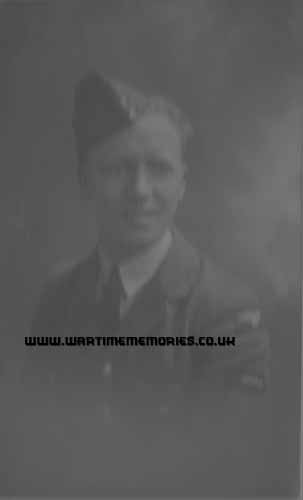LAC James Christopher Kershaw MID
Royal Air Force Volunteer Reserve RAF Honeybourne
from:Rawtenstall, Rossendale, Lancashire
As a young man who applied for service during World War II, James Kershaw found himself in the Royal Air Force Volunteer Reserve under the Officer Commanding RAF Station Honeybourne, Worcester as a member of the fire crew. He was born on 20th October 1920, which puts him in his twenties during his service years.
As far as I know, their job was to prepare the aircraft for its outward journey and its somewhat precarious return after a sortie. I remember James (my dad) telling me about how the planes had often been shot to pieces and it was miraculous that some of them got back. Some that did make it thus far would have damaged landing gear and it was the job of the fire crew to get the pilot and other airmen out of the plane on landing as soon as possible.
An account of what happened is written by Air Chief Marshall A.T. Harris KCB, OBE, AFC and I have a framed copy of this letter:
Air Chief Marshall A.T. Harris KCB, OBE, AFC
A.124
The Commander-in-Chief wishes to bring to the notice of all ranks in the Command, the courage and devotion to duty displayed by the under mentioned airmen of R.A.F. Station, Honeybourne:
- 1669210 LAC Leighs, W.S.
- 1313399 AC1 Herritage, S.G.
- 1161330 LAC Hancock, A.
- 1505750 AC1 Fennell, J.A.
- 1143912 LAC Kershaw, J.
- 1689333 AC1 Hodgson, S.W.
- 3011580 AC2 Ealeson, R.
- 1421278 LAC Taylor, L.F.E.
On the night of 3rd/4th July 1944, an aircraft apparently stalled on coming into land, crashed into the bomb dump and burst into flames. The fire which started ignited a large number of explosive incendiary bombs. The above mentioned airmen, who together constituted the duty and stand-by fire tender crews, proceeded immediately to the scene of the crash and under the direction of the Fire Officer and of the NCO in charge of the fire party, tackled the fire which by then had assumed serious proportions. Despite the intense heat arising from the combination of blazing petrol and explosive phosphorus bombs, and the serious risk of explosion from the presence of high explosive bombs in the dump, the crew continued to fight the fire from close range without any form of protection and with complete disregard for their own personal safety. So successful were their efforts, that within one and a half hours the fire was completely extinguished and all danger of the remainder of the dump becoming ignited was removed; had the fire not been so promptly and thoroughly checked, there would not only have been extensive loss of government property, but also a possibility of loss of life. Although the crew of the aircraft were killed almost instantaneously, and it was not possible to recover any of the bodies, it is considered that all members of the Fire Tender crew displayed a high standard of courage and devotion to duty as well as a complete disregard for their own safety in circumstances of great difficulty and danger.
BC/23054/P.
I also have in a frame which reads:
By the Kings Order the name of Leading Aircraftman J. Kershaw, Royal Air Force Volunteer Reserve,was published in the London Gazette on 1st January 1945 as mentioned in a Despatch for distinguished service. I am charged to record His Majestys high appreciation.
Signed by Secretary of State for Air.
In addition I have in a frame an embossed letter from RAF Station Honeybourne:
Royal air Force Station, Honeybourne, Evesham, Worcs
Ref: HB/C.70010.
Dear Kershaw,
I am attaching a copy of a Command Routing Order which has been received on the unit.
It is the Commander-in Chiefs wish that you should have a copy of this Order as a record of your courage and devotion to duty.
My heartiest congratulations to you as well as my sincere thanks for your valiant efforts.
Yours sincerely,
Group Captain, Commanding,
RAF Station Honeybourne
No.1143912 LAC. Kershaw, J, RAF Station Honeybourne, Worcs.
And here is the copy of the above mentioned letter:
From: Officer Commanding, RAF Station, Honeybourne, Worcs.
To: LAC J. Kershaw, RAF Honeybourne.
Date: 8th January 1945
Ref: HB/C.70010/3.
Honours and Awards.
Your name appeared in the New Years Honours List as having been Mentioned in Despatches by the Air Officer Commanding-in-Chief Bomber Command.
The Air Officer Commanding No. 91 Group wishes his best congratulations conveyed to you, on this well deserved recognition of your service.
I would like to associate myself with the remarks of the AOC No. 91 Group.
Signed Group Captain, Commanding, RAF Station, Honeybourne.
My dad, James, seldom spoke about the duties he performed during the war years but he did occasionally mention the horrendous injuries of airmen returning from their sorties as we gathered around the TV watching war films. I remember dad, watching the parades of servicemen and women passing the Cenotaph in London in November on the TV remarking on how the uniform of the Air Force personnel was always the smartest.
I am very proud of my dad.



